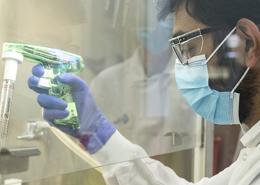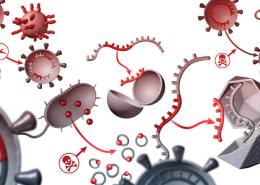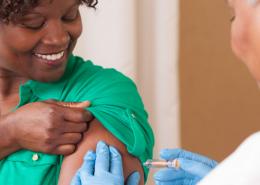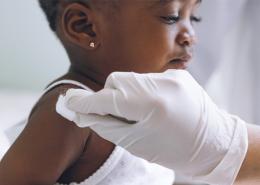From Basic Health to Herd Immunity: What is the Purpose of Vaccines?

In our increasingly interconnected world, where illness can spread quickly from person to person, and even country to country, vaccines can offer protection. In fact, the World Health Organization refers to immunization as “one of modern medicine’s greatest success stories” for its ability to prevent and control infectious diseases, such as polio, influenza, and measles.1
Vincenza Snow, MD, who is Pfizer’s U.S. Medical Affairs Policy Lead for Vaccines, agrees with that assessment. “Vaccines are one of the greatest public health interventions of all time, along with clean water,” she notes.
Thanks to immunization, we’ve eradicated smallpox, nearly eliminated polio, and seen diseases such as measles, diphtheria, and whooping cough reach historic lows.2 That’s because vaccines can protect people on an individual level, as well as a community level, says Snow, while also helping to shield populations from the economic toll of infectious diseases.
Vaccines protect the individual and the community
The purpose of a vaccine is to control a disease, Snow says. Vaccines work directly by training a person’s immune system to respond and protect them from getting a particular infection. Or, if they do get sick, it can prevent them from becoming seriously ill.3
Some vaccines may also offer indirect protection to those who spend time near a vaccinated individual, says Snow. Because a vaccinated person has developed immunity to a pathogen, they’re less likely to pass it on to others. “They're not just protecting themselves, but they may also diminish transmission to the people they live with,” she says. “If they're caretakers, if they have elderly parents or small children, vaccination potentially offers the additional benefit of protecting others.”
That benefit can even extend to the community at large. “Herd immunity,” also known as “community immunity,” happens when enough of the community is immune to a particular disease, either because of vaccination or natural infection, that it makes it less likely to spread from one person to another.4 “As you vaccinate more and more people, the virus or the bacteria has less opportunity to be carried or transmitted,” says Snow.
She points to the pneumococcal conjugate vaccine as an example of an immunization that helps protect the community. This vaccine can prevent illnesses caused by pneumococcal bacteria included in the vaccine, which can include pneumonia, ear infections, and bacteremia (which is an infection of the blood).
Young children and older adults face the highest risk of becoming ill.5 The vaccine is able to stop the transmission of the illness from person to person, says Snow, because it stops the vaccinated person from carrying the bacteria, which therefore keeps them from passing it along to others.
In the years since the FDA licensed the first pneumococcal conjugate vaccine for use in children in 20006 and healthcare providers began routinely giving it to children, it was observed that the number of older adults who have been hospitalized with invasive pneumococcal infections has decreased.7 Snow says that while vaccinating children has helped provide some indirect protection to vulnerable adults, it is still important to provide direct protection to adults by vaccinating them as well.
The proportion of the population that must be vaccinated to achieve herd immunity varies by disease and vaccine, says Snow. Herd immunity against measles, for example, requires vaccination in about 95% of the community, 8 while polio requires vaccination in about 80%.
However, in cases where viruses mutate as they spread from person to person—such as COVID-19 and influenza—developing community immunity is much less likely, says Snow. “It's not easy to achieve herd immunity for any vaccine, even the most highly efficacious,” she says. “Even in vaccines with very high immunization rates, there are always breakthrough cases,” says Snow.
Why should you get vaccinated?
Not everyone chooses to get vaccinated. Some people may say they prefer to get the illness, instead, and develop natural immunity. Doing so, says Snow, is risky, because it’s impossible to predict how sick an infectious disease could make an individual.
She uses chickenpox as an example: “You may have a mild case, you may have a severe case,” says Snow. “People think ‘Oh, I’ll just get chickenpox and be fine.’ But adults can get severe cases of chickenpox and end up in the ICU.”
Vaccines, she says, are a safer option than gambling with your health. “If you get vaccinated, you can avoid getting ill and you acquire immunity that’s of good quality,” says Snow. Plus, it’s a decision that could benefit you, as well as your loved ones.
Sources
- WHO. Immunization. Available at https://www.who.int/news-room/facts-in-pictures/detail/immunization#. Dec. 5, 2019. Accessed Sept. 13, 2022.
- CDC. Overview, History, and How the Safety Process Works. Available at https://www.cdc.gov/vaccinesafety/ensuringsafety/history/index.html. Page last reviewed Sept. 9, 2020. Accessed Sept. 13, 2022.
- CDC. Understanding How Vaccines Work. Available at https://www.cdc.gov/vaccines/hcp/conversations/understanding-vacc-work.html. Page last reviewed May 23, 2022. Accessed Sept. 13, 2022.
- CDC. Glossary. Community Immunity. Available at https://www.cdc.gov/vaccines/terms/glossary.html. Page last reviewed July 30, 2020. Accessed Sept. 8, 2022.
- CDC. Pneumococcal Conjugate VIS. Available at https://www.cdc.gov/vaccines/hcp/vis/vis-statements/pcv.html. 2/4/22. Accessed Sept. 13, 2022.
- CDC. Pneumococcal Vaccination: What Everyone Should Know. Available at https://www.cdc.gov/vaccines/vpd/pneumo/public/index.html. Page last reviewed Jan. 24, 2022. Accessed Sept. 13. 2022.
- U.S. Department of Health and Human Services. Vaccines Protect Your Community. Available at https://www.hhs.gov/immunization/basics/work/protection/index.html. Page last reviewed April 29, 2021. Accessed Sept. 13, 2022.
- WHO. Coronavirus disease (COVID-19): Herd immunity, lockdowns and COVID-19. Available at https://www.who.int/news-room/questions-and-answers/item/herd-immunity-lockdowns-and-covid-19. Dec. 31, 2020. Accessed Sept. 13, 2022.




